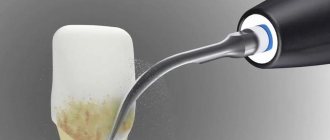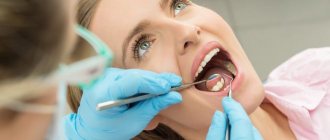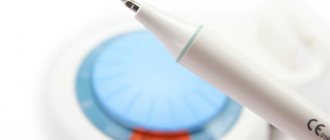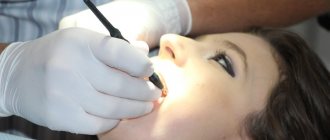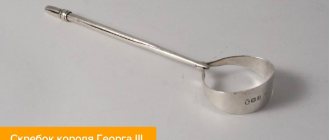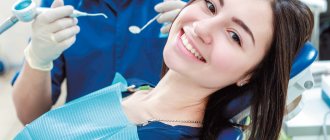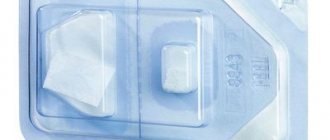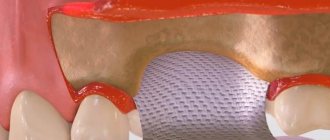Towards the end of the diaper and romper period, it can be scary to look into your mouth. Concern is brought not only by the lack of shine of teeth, but also by their outstanding fragility. The constant presence of dental chips in the mouth causes irritation. There is no need to talk about the absorption of fruits at all, only in grated form - the teeth do not tolerate stress. Let's add to this increased bleeding and salivation.
In order for the child to be born healthy and beautiful, and for the expectant mother to maintain a dazzlingly attractive smile, it is necessary to listen to the advice of specialists.
Forgotten caries
Everyone advises planning a pregnancy, but in some situations it is quite difficult. Pregnancy does not always occur when you want it. In some situations, you have to wait for years for the appearance of a lucky star. Preparations can take so long that it’s easy to forget about pregnancy. And there is no need to talk about a random “vagrant bird”. In general, the first thing a pregnant woman needs to do after returning from the gynecologist is to make an appointment with the dentist. The feeling of complete health is often apparent. A careful examination of the dentition will definitely reveal a couple of holes.
Caries is based on three main problems: damage to the enamel, eating a lot of sweets and microflora in the mouth.
During pregnancy, all three causes are hypertrophied. Frequent vomiting in the first trimester can lead to “acidification” of saliva. Increased appetite contributes to the consumption of more easily digestible carbohydrates (sugar, chocolate, etc.).
In an acidic environment and in the presence of carbohydrates, microflora develops quickly. A vicious circle is formed. Microorganisms, breaking down sugar, contribute to even greater acidification of saliva and destroy enamel. Considering the causes of caries, it becomes clear how important prevention is.
Treatment of caries during pregnancy is not contraindicated, rather the opposite. All kinds of holes in the teeth, even small ones, should be healed. Remember that a small hole can be the entrance to a larger cave.
There are no restrictions regarding the filling material. Moreover, it is better to use a fluoride filling material (which uses a special lamp to cure).
Superficial caries, as a rule, does not require mandatory anesthesia. But if ordinary caries is complicated by the development of pulpitis, then you cannot do without an anesthetic. The doctor will select the safest drug.
I feel what I feel in my teeth
During pregnancy, it is especially important to eat right.
However, if hot and cold dishes cause severe aching pain, appetite disappears, in this case at least two suffer (mother and fetus).
The problem of increased tooth sensitivity is associated with the thinning of the enamel, which, like a shell, covers the underlying dentin, enveloping the vessels and the actual sources of pain - the nerves. The appearance of pain is an impetus that forces you to go to the dentist. There may be several reasons for thinning enamel. One of them, the most common, is the loss of calcium by the enamel, as a result of insufficient intake from food and increased consumption by the body. Another reason is early toxicosis, which was already mentioned above. Another reason that is not related to pregnancy, but does occur, is the wrong choice of toothpaste.
Toothpastes of the “Sensitive” type have been developed especially for those with teeth with increased sensitivity.
According to dentists, the most common cause of tooth sensitivity is improper brushing.
To learn how to properly brush your teeth, you must contact a dental center. Training is carried out individually in one session. The cost of this procedure is about 300 rubles. As a rule, the dentist invites the pregnant woman for a follow-up cleaning. To assess whether the patient is coping with the task correctly or not.
Tooth sensitivity can be caused by cervical caries, when a hole in the tooth is located at its base, next to the gum. Then the solution to the problem is only a filling in the problem area. If tooth sensitivity does not decrease, despite all efforts, then “Sensigel” will help, it contains special substances that reduce tooth sensitivity. The cost of the drug is 180-190 rubles. The dental office has pharmacological agents to reduce tooth sensitivity that have a prolonged effect (up to 6 months), but the cost of the procedure is much more expensive.
How does an X-ray machine work?
At the heart of the X-ray machine is an X-ray tube, in which electrons accelerated to high speeds are removed from metal atoms, resulting in X-ray radiation. X-rays pass in a narrow beam through the area of the body being examined, in this case the tooth and part of the tissue around it. The patient holds a photographic plate behind the tooth, on which the image appears. In this case, the width of the beam approximately corresponds to the size of the plate. That is, only a small space around the tooth is trained, and all other organs and tissues remain untouched by radiation.
A narrow beam affects only the teeth and the tissue around them
Important! The radiation intensity is so low that even several photographs of one tooth in a row are not dangerous to health.
Bleeding Gums
If you suddenly notice that while brushing your teeth, traces of blood remain on the brush, and when you further rinse your mouth, the foam from the toothpaste turns pink, this means that you have increased bleeding gums. Increased bleeding is a warning sign that all is not well.
Healthy teeth do not necessarily mean healthy gums. Increased bleeding of gums during pregnancy is not uncommon. It may be due to hormonal changes in a woman’s body. To solve this problem, you need to consult a doctor. In this case, the diagnosis sounds like this: “gingivitis of pregnant women.”
To prevent the occurrence of this unpleasant disease, plaque should be removed and tartar in the subgingival area should be removed. In a dental office, these procedures are performed using different techniques. One of them, the so-called “air flow,” is carried out without the use of a bur and without a tip. A stream of air, water and powder flows under pressure. In this way, plaque and partially tartar are removed. This procedure is also called gentle whitening, since the teeth are restored to their natural shine and whiteness, and the enamel structure does not deteriorate.
Another method of preventing gingivitis allows you to completely remove massive deposits of tartar. It requires the use of ultrasound. The procedure is completed by polishing the teeth and coating them with a special fluoride varnish. Both “air flow” and other methods will require significant material costs. The cost is approximately the same - 80-90 rubles per tooth.
As a rule, gum inflammation is caused by “harmful” microflora of the oral cavity.
A number of toothpastes, including extracts of medicinal plants, have an antiseptic effect. Additions of chamomile, calendula, and sage relieve inflammation and strengthen the gums. To enhance the effect of the paste, it is supplied with a complex of vitamins.
If, however, gingivitis does develop, then after removing plaque and tartar, the dentist will most likely suggest using a special gel for the gums; you can read about it in more detail in the “review of oral hygiene products for pregnant women.”
The gel is used in addition to toothpaste, and not instead. If the manifestations of gingivitis are severe, then gingival anti-inflammatory dressings are used. The course is 3-10 sessions. They contribute to the rapid subsidence of the inflammatory process and reduce bleeding.
It is worth checking your toothbrush; sometimes the reasons for increased bleeding of the gums are quite commonplace - the bristles are too hard.
Increased bleeding may be a symptom of a more serious disease - periodontitis. Periodontium is the soft tissue surrounding the tooth. Their inflammation is periodontitis. It is quite severe and can result in the loss of healthy teeth.
I don't want to eat, but my mouth is watering
During pregnancy, drooling is common. This type of toxicosis does not pose a threat when it is moderate. Sometimes drooling is a consequence of uncontrollable vomiting. When it takes on a grandiose scale, solivation can reach 1 liter per day.
In this case, the appetite is impaired, the patient loses weight, her health worsens, and the patient must be admitted to a hospital. Treatment is necessary to avoid significant fluid loss. Moreover, with severe salivation, maceration of the skin around the mouth occurs, which can become an entry point for infection.
Some toothpastes have astringent properties: “Localut”, “Oral B”, etc. To prevent irritation, apply a rich cream to the facial skin. X-RAY
Is dental examination contraindicated during pregnancy?
It’s not for nothing that everyone advises to heal your teeth before pregnancy. After all, once it occurs, dental treatment can be difficult. It should be noted that we are talking about problem teeth, for which a simple filling is not an option. Sometimes, in order to provide qualified assistance, it is necessary to first take a picture of the tooth, and then, depending on the situation, treat or remove it. In the first and last trimesters of pregnancy, X-ray examination is not recommended. However, in the second trimester of pregnancy, the ban on dental x-rays is lifted.
If suddenly a problematic tooth makes itself known at the wrong time, and the doctor insists on taking an image, you should not worry too much about it. Because before taking a picture, the laboratory technician will put on a lead apron, which will protect you from that insignificant dose of X-rays that are necessary in this situation.
To avoid trouble, it is better to inform your dentist about your pregnancy. There is a more gentle research method - computer visiography. In this case, the image of the tooth is displayed on a computer screen, the X-ray beam is more focused, and the dose is approximately 10 times less than when taking a conventional X-ray.
Advantages of contacting PROFI-Dent
- Absolute safety of dental intervention at any stage of pregnancy.
- A team of experienced dentists of all specialties.
- An integrated approach to diagnosis and treatment.
- Unique proprietary therapeutic techniques.
- Affordable prices for the full range of dental services.
Healthy teeth for the father and mother are the key to healthy teeth for the child
Already in the fifth or sixth week of pregnancy, the rudiments of the baby’s teeth are formed. If the mother has a “bad” mouth by this period of pregnancy, then the process of mineralization of the fetal tooth buds is disrupted, which over time will lead to problems for the child, both with milk and permanent teeth.
For normal growth of bones and tissues of the unborn child, in addition to other minerals, sufficient amounts of calcium and fluoride are necessary. A well-balanced diet rich in vitamins A, C, D, minerals, plus nutritional supplements or prenatal vitamins will fully compensate the body and promote good overall health and normal dental development for the baby. Nutritional supplements and vitamin-calcium complexes are individually selected by a gynecologist.
Foods richest in calcium: milk and dairy products, kale, broccoli, spinach, baby turnips. Calcium is best absorbed from fish products.
A lack of calcium may be indicated by seizures and tooth decay in the mother. If symptoms appear, you should consult a doctor. You should not take calcium supplements on your own, as an excess of it will lead to skeletal disorders in the fetus.
However, the quality of the baby’s teeth depends not only on the condition of the mother’s teeth. Half of all dental problems in babies are caused by their father. No matter how much a pregnant woman takes care of her mouth, when communicating with her husband, kissing him, she transfers “harmful” microflora into her oral cavity. The husband should have all his teeth treated after, or better yet before, he finds out about his wife’s pregnancy.
There probably won’t be a parent who hasn’t hugged and kissed their barely born child. Every kiss is a swarm of microorganisms, and not always harmless ones.
Be it a father, grandfather or grandmother, everyone considers it their duty to cuddle and breathe on the baby. Before allowing all relatives near the baby, a prudent mother should first send her household members to the dentist's line.
Carrying out procedures
All dental procedures are carried out after a preliminary consultation with a gynecologist and a general assessment of the need for dental intervention. A thorough examination and high-quality anesthesia are the key to effective treatment of diseases of the hard and soft tissues of the oral cavity.
Regular examination by a dentist and timely prevention of oral diseases are integral components of the health of the mother and fetus. You should not put off visiting a specialist and hope that the problem will solve itself. Modern dentistry has made a big leap in treatment, pain relief and treatment procedures for pregnant women, so if you doubt whether it is worth treating your teeth during pregnancy, then yes, it is definitely worth it.
Germs and prevention
Expectant mothers simply have to watch their mouth. Severe microbial infection of the teeth and gums of the expectant mother can serve a very sad purpose. Poor hygiene facilitates the unhindered penetration of bacteria from the mother’s mouth into the body of her baby. To prevent unpleasant consequences it is necessary:
- Brush your teeth after each meal for 2-3 minutes, since the action of the antibacterial and mineral components of toothpastes occurs when the paste is in the mouth for at least this time.
- Use additional oral hygiene products (gels, rinses, breath fresheners).
- Change your toothbrush every 3 months.
- Carry out professional teeth cleaning at least once every 4 months, and after childbirth - once every 6 months.
The most favorable times for dental treatment during pregnancy:
1st visit - at 6-9 weeks of pregnancy, 2nd visit - at 16-18 weeks, 3rd - at 26-28 weeks, 4th and last visit - before birth at 36 -38th week of pregnancy.
Before pregnancy and after childbirth, optimal special periods are not established.
Is it possible to do x-rays?
It is not advisable for pregnant women to undergo X-rays, and it is strictly contraindicated in the first trimester. But at a later date, if there is evidence, such a procedure is possible. Fortunately, modern dentistry uses equipment with highly sensitive sensors and minimal radiation. During the examination, the patient’s chest and abdomen are covered with a lead apron.
Attention!
To avoid the risk of complications in the fetus, it is worth taking care of prevention at the stage of pregnancy planning. Before deciding to expand the family, a woman needs to consult a dentist, cure all carious lesions, chronic diseases of the gums and periodontal tissues, and, if necessary, undergo procedures to strengthen tooth enamel. Those who are preparing to become a mother need to pay special attention to hygiene and proper oral care, because during pregnancy the risk of developing caries increases.
“Tooth rash” after childbirth?
I hope that the child was not born in pain? In order for the child to grow and develop quickly, nature provided the woman with a source of nutrition for the baby - milk. Constant production of a nutritious product is possible only with a regular supply of necessary vitamins from outside. If the teeth have withstood the stress of pregnancy, this does not mean that the feeding process will go unnoticed. It happens that during feeding, teeth simply “melt” before our eyes. What's happening?
Apparently, there is a lack of calcium (or fluorine) in the body. In order to prevent possible destruction, it is necessary to ensure a sufficient supply of minerals, taking into account the consumption for the formation of milk. The mammary glands produce about a liter of milk per day (or even more).
What radiation doses are dangerous?
Radiation doses greater than 1 rad are dangerous for humans. This is the dose at which mutations occur in the fetus in about 4% of cases. If an X-ray of the entire oral cavity is taken, the woman will not receive a radiation dose of more than 0.0002 rad. If we take into account that the beam is narrow and is not directed at the woman’s uterus, then the fetus will not receive a radiation dose at all. Therefore, we can say with confidence that dental x-rays are safe.
X-rays of the jaw require a higher dose of radiation, but even this dose is too small to harm the mother or fetus
Dental prosthetics and pregnancy
This problem is especially relevant during late pregnancy. After 30 years, it is difficult to find a woman who has not lost at least one tooth. And if there are no teeth or they require removal, then the question of prosthetics arises. Anyone who has already received their “bridge” or “implant” knows how much time, effort and money goes into this process (in any case, a good half of the pregnancy can pass).
Is it possible to have dental prosthetics during pregnancy? Yes, you can. When using modern materials, prosthetics can be completed in 2 weeks. This process will require 2-3 visits. If pregnancy occurs after the start of the prosthetic process, then it is necessary to complete it, since against the background of hormonal changes in the body, the teeth may become loose, change the position and inclination, which will further complicate prosthetics.
Implantation is out of the question, since this is a surgical operation, it is difficult to perform and complications may occur.
Effect of anesthesia
Sitting at the dentist's office, people are afraid of the discomfort and pain that always accompany dental treatment. But a solution has long been found - pain relief. How do pregnant women tolerate anesthesia? Are they allowed to take painkillers? Many dentists answer that such an injection is simply necessary. After all, expectant mothers will experience unnecessary anxiety and fear of feeling pain while waiting for their turn to see a doctor. And stress negatively affects the well-being and development of the baby in the womb, so she does not need worry at all and is even contraindicated.
Is it safe to give a painkiller injection to pregnant women? If we are talking about general anesthesia, then its influence can still negatively affect both the child and the expectant mother. But local anesthesia can be done using modern medications. They will perfectly anesthetize a small area of the gum, since they act in a targeted manner, and will limit the pregnant woman from terrible torment in the dental chair during the treatment process. In addition, the dose of the drug is very small, so you should not be afraid that the drug gets to the baby along with the blood; its components will still not pass through the placenta.
Rotten tooth! Delete or wait?
Elena K.: “Before pregnancy, I had very bad teeth, some required removal, and I didn’t have enough time and courage to go to the dentist. Now that I'm pregnant, I'm afraid of being completely without teeth. What is the best thing to do?
Due to the environment, not everyone can boast of healthy and white teeth, especially those with average and low incomes. So if pregnancy threatens to deprive you of your last teeth, you need to take immediate action. Remove all rotten, damaged teeth that cannot be restored. Firstly, this will eliminate the source of infection from the mouth, and secondly, diseased teeth tend to worsen during childbirth. And then you may have to give birth in the dentist’s office with an acute toothache.
Thanks to the development of new anesthetics that do not pass through the blood-placental barrier, removal will not be a particular problem. New drugs “Ubistezin” and “Ultracain DS” will provide fast and reliable anesthesia.
The safest time for tooth extraction is the 3-6th month of pregnancy.
Regular toothbrush or electric?
During the first half of pregnancy, a medium-hard toothbrush is suitable. By the third trimester, it is better to choose a soft brush, as this will avoid bleeding gums. Of course, unless there is a tendency to form hard plaque.
If you are used to using an electric toothbrush, then it is better to put it aside during pregnancy and use it only occasionally. Undoubtedly, the electric miracle removes plaque better. However, it has a greater traumatic effect on the gums than a regular toothbrush, and the gums are perhaps one of the most vulnerable places in a pregnant woman’s mouth.
If you really want to thoroughly clean your teeth, leave this procedure to a professional. Cleaning your teeth at the dentist's office will cost about 1,000 rubles.

